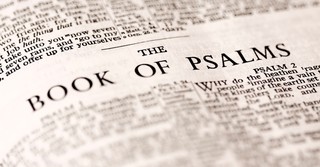The Other Psalmists: Who Were the Sons of Korah?
Share

Although King David wrote the majority of the book of Psalms, readers may have encountered passages in the 150-chapter book that said, “A maskil of the sons of Korah” (Psalm 42), or “A Psalm of the Sons of Korah” (Psalm 84). (A maskil denotes a specific type of musical performance to accompany the Psalm).
Many Bible readers may not be familiar with the personhood of Korah or his sons who contributed to this book, found in the middle of the Bible. Who was Korah, why did his sons write portions of the Psalms, when did they write their contributions to the Bible, and what can we learn from all of these men?
Photo credit: ©Getty Images/CaseyHillPhoto
Who Was Korah?

Readers immediately run into an issue with this question right off the bat. Not because we have no Korah in the Bible, but because we see three different Korahs mentioned, explains Got Questions. The article mentions four, but the first and second Korah mentioned appear to be one and the same person.
The first Korah was the son of a woman named Oholibamah (Genesis 36:5), one of the wives of Esau, a grandson of Abraham. Oholibamah comes from a group of people known as the Hivites, a branch of the Hitties. Korah later becomes a chief (Genesis 36:18). We don’t know much else about this man.
The second Korah hails from 1 Chronicles 2:34, a son of a man named Hebron. Aside from that, readers have no other details about this Korah.
The third and final Korah seems to be the one the sons hail from in the Psalms. “Sons” can have a different meaning in the Bible than a biological son – it can also mean descendants. For instance, Belshazzar is called Nebuchadnezzar’s son in the Bible, but really, he’s his grandson (Daniel 5).
Now, although Korah’s descendants may have written a portion of the Psalms, Korah himself actually earned infamy in Numbers 16.
In this passage, Korah gathers a group of 250 men and attempts to bully Moses and Aaron about the fact they had chose the Levites in particular to carry out the holy duties of the Lord. This happens during the years Israel had wandered in the desert. Not only does Korah question Moses’ decision here, but God’s as well.
In a similar fashion to Elijah and the prophets of Baal, Moses decides to put Korah and his 250 men to the test. He tells them to return the next day with something known as a censer – essentially a vessel filled with incense.
The next day, at the Tabernacle, the earth opens and swallows Korah, two other rebels named Dathan and Abiram, and their families. Fire from heaven then consumes the other 250 rebels who had followed Korah and questioned God.
Photo credit: ©Getty Images/Anyaberkut
Is This an Extreme Reaction?

Readers, especially of a modern mindset, may find the passage disturbing. After all, wasn’t Korah simply frustrated that the Levites had more holy duties than the rest of the people? Why did God cause a sinkhole to eat him, and burn his other followers alive?
As the passage in Numbers 16 indicates, Korah’s rebellion goes a little beyond grumbling against Levitical practices. He questions who God has placed in leadership over Israel, especially religious leadership.
Korah rebels not only against Moses, but against God, thinking he can do better work than both of them. Not to mention, Korah was a descendant of Levi, meaning he would’ve been set apart already for religious duties, but he abuses that role and confronts Moses and God. He even gathered a band together to intimidate Moses and Aaron and to form his own separate faction if needed.
Korah fails the test and even serves as a cautionary tale into the New Testament in Jude 1:11, that those who follow false leaders and prophets, not appointed by God, will lead themselves right into destruction.
Nevertheless, even though Korah and the rebels died that day, Korah’s lineage continues, until we encounter the sons (descendants) of Korah, who authored many Psalms (Numbers 26:11).
Photo credit: ©Getty Images/master1305
Who Are the Sons of Korah?

Exodus 6:24 lists the names of three sons of Korah: Assir, Elkanah, and Abiasaph, who form tribes of a group of people known as the Korahites. To clarify – these were Korah’s literal children, not the authors of the Psalms. However, the successive line seems to go all the way through the prophet Samuel and beyond.
They appear to separate themselves from their father’s legacy. Either they were old enough to distance themselves when Korah joined forces with Dathan and Abiram, or too young for God to take action against them, since they were not cognizant of their father’s actions.
Descendants of the Korahites served as doorkeepers and soldiers with King David, explains this Got Questions article. Three descendants of the line of Korah go on to become great musical masters and pen the Psalms: Heman, Asaph, and Ethan.
Heman, a grandson of Samuel, penned Psalm 88, and was known for his wisdom.
Asaph, one of the leaders of David’s choir, served as a musician and seer. Other men by the name of Asaph serve men such as King Hezekiah and Nehemiah.
And Ethan (or Jeduthan), another one of David’s chief musicians, also served as a prophet like Asaph. He, Asaph, and Heman served as choral directors of the Psalms, which would have been accompanied by music.
Photo credit: ©Getty Images/Richard Villalonundefined undefined
What Can Readers Learn from Korah and His Sons?

Readers could not find two more polar-opposite types of people in the Bible. Korah is given a high position and he abuses it, questioning God’s authority. His descendants serve under the rulers God has placed over them and they serve both the rulers and God well. There are three powerful takeaways from this biblical family:
1. Family legacies do not determine everything.
Even though Korah lives in infamy throughout the Bible, his family legacy does not. Through his line, we have Samuel – a man of God – the Korahites, and his three descendants who write Psalms.
Other figures in the Bible had wicked fathers such as Hezekiah and Josiah, but those kings chose to trust God and rewrite their family legacy.
2. Going against God has consequences.
Korah didn’t simply gather 250 people to calmly talk with Moses and God about some ideas about the priesthood practices. It was a contemplated, planned rebellion. He even gathers well-known leaders to come up against Moses.
He was clear in what he was saying. Fulfill our demands, or we will run everything differently around here. Korah questions God’s decisions and appointed leaders and ends up reaping the consequences.
3. God can redeem anything and anyone.
After reading about Korah dying in an earthquake or a sinkhole (the earth swallowing him up) one would think the story ends there, but God continues Korah’s line. Several holy men proceed from that line and give glory back to the Lord, unlike their ancestor Korah.
Although Korah’s legacy descended into infamy, the sons of Korah lived on to produce works that magnified the Lord while they served their leaders well. They are truly an example of Jesus’ saying, “From everyone who has been given much, much will be demanded; and from the one who has been entrusted with much, much more will be asked” (Luke 12:48).
Korah was given a high position in leadership, and he abused it by questioning God’s decisions.
Korah’s sons were given musical talents and other gifts, and they gave it all back to the Lord.
Photo credit: ©Getty Images/kieferpix

Hope Bolinger is an acquisitions editor at End Game Press, book editor for hire, and the author of almost 30 books. More than 1500 of her works have been featured in various publications. Check out her books at hopebolinger.com for clean books in most genres, great for adults and kids. Check out her editing profile at Reedsy.com to find out about hiring her for your next book project.